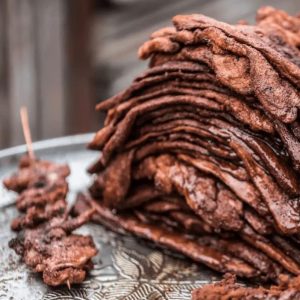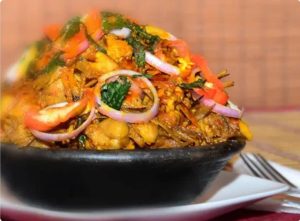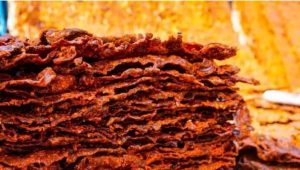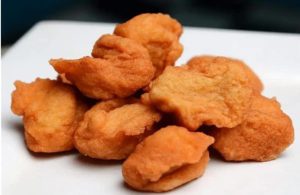Nigerian cuisine is renowned for its rich flavors, vibrant colors, and diverse ingredients.
However, amid the array of delicious dishes, there are some foods that, despite their popularity, pose significant health risks.
Here are five silent killer foods that many Nigerians love:
1. Suya (Carcinogenic)

Suya
Suya, a spicy skewered meat popular across Nigeria, is a favorite street food enjoyed by many. However, this tasty delight comes with a hidden danger. The process of grilling meat at high temperatures can lead to the formation of carcinogenic compounds known as heterocyclic amines (HCAs) and polycyclic aromatic hydrocarbons (PAHs). These compounds have been linked to an increased risk of cancer. Regular consumption of suya, particularly when it is charred, can elevate this risk, making it a silent killer on the dinner table.
2. Shawarma (Due to Hot Dogs)

Shawarma
Shawarma, a Middle Eastern-inspired wrap filled with spiced meat, vegetables, and sauces, has become immensely popular in Nigeria. Often, hot dogs or other processed meats are used in the filling, which contain preservatives like nitrates and nitrites. These preservatives can convert into nitrosamines, which are carcinogenic. Furthermore, processed meats have been linked to various health issues, including heart disease and diabetes. Despite its delicious taste, frequent consumption of shawarma can contribute to these health problems.
3. Nkwobi (Excess Potassium)

Nkwobi
Nkwobi, a delicacy made from cow feet cooked in a spicy palm oil sauce, is a beloved traditional dish. However, it is also a silent killer due to its high potassium content. For individuals with kidney problems or those at risk of hyperkalemia (high potassium levels), consuming Nkwobi can be dangerous. Excess potassium can lead to irregular heartbeats and even heart failure. While it is a flavorful dish, those with existing health conditions need to be cautious about its consumption.
4. Kilishi

Kilishi
Kilishi, a dried, spicy meat similar to jerky, is another Nigerian favorite. The drying and seasoning process often involves adding a significant amount of salt, which can contribute to high blood pressure (hypertension). Although kilishi is a convenient and tasty snack, its high salt content makes it a silent threat to cardiovascular health.
5. Deep-Fried Snacks

Deep Fried Snacks (Akara)
Deep-fried snacks such as puff-puff, buns, akara (bean cakes), and plantain chips are immensely popular in Nigeria. These snacks, while delicious, are often cooked in unhealthy oils that contain trans fats. Trans fats are known to increase bad cholesterol (LDL) levels and decrease good cholesterol (HDL) levels, leading to an increased risk of heart disease, stroke, and type 2 diabetes. Additionally, the high-calorie content of deep-fried foods can contribute to obesity, which is a risk factor for numerous chronic diseases.

 Politics9 months ago
Politics9 months ago
 Business10 months ago
Business10 months ago
 Politics6 months ago
Politics6 months ago
 SportsNews9 months ago
SportsNews9 months ago
 Politics9 months ago
Politics9 months ago
 Entertainment9 months ago
Entertainment9 months ago
 Politics6 months ago
Politics6 months ago
 Business9 months ago
Business9 months ago


















